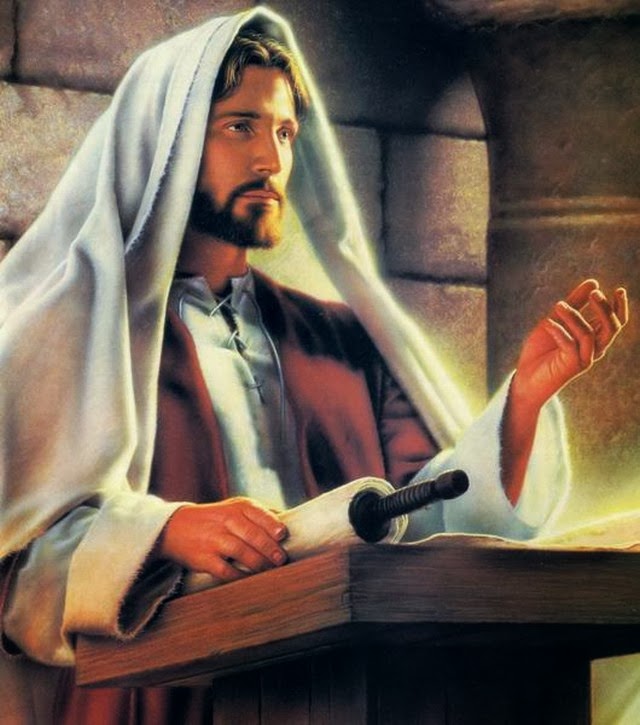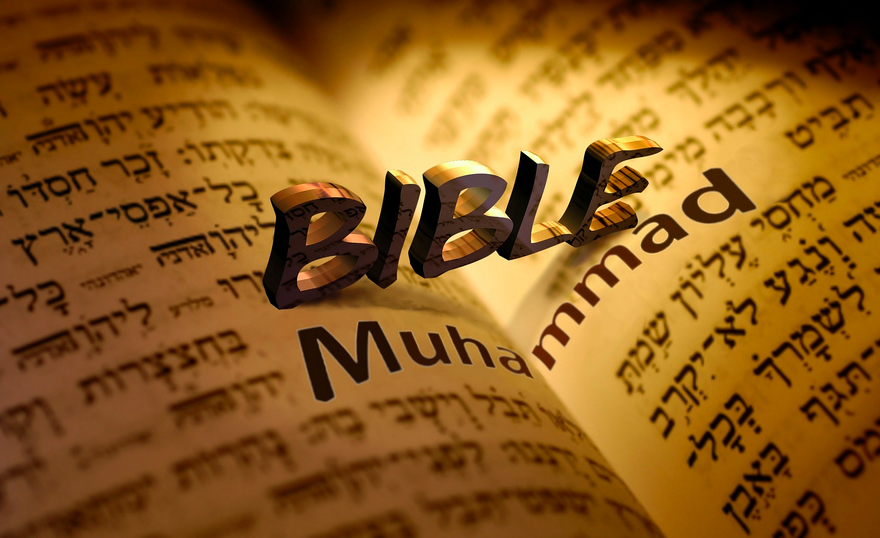In modern times, there have been some attempt by some Muslim Apologist to seek relevance and evidence for the Salat (the Islamic prayer) in the Bible, as doing this will not only prove the authenticity of the practice, but that this “truth” according to them has been preserved in the Bible as well.
Even though we recognized the fact that not all Muslim holds this view, we shall, for the sake of some Christians who are interested in this subject, take a look at it together.
The text often quoted for this can be found in Nehemiah 8:4-6, which reads as follows:
4 And Ezra the scribe stood upon a pulpit of wood, which they had made for the purpose; and beside him stood Mattithiah, and Shema, and Anaiah, and Urijah, and Hilkiah, and Maaseiah, on his right hand; and on his left hand, Pedaiah, and Mishael, and Malchiah, and Hashum, and Hashbadana, Zechariah, and Meshullam.
5 And Ezra opened the book in the sight of all the people; (for he was above all the people;) and when he opened it, all the people stood up:
6 And Ezra blessed the LORD, the great God. And all the people answered, Amen, Amen, with lifting up their hands: and they bowed their heads, and worshipped the LORD with their faces to the ground.
A Muslim reading this therefore concludes that this is the Islamic mode of worship practically demonstrated in the Bible, which was neglected by Christians. We shall examine this verse very closely to see if this is indeed the truth.
To make this a detailed study, we shall be looking at this verse in context, thereby providing the background information, starting from verse one making some distinct observation that was left out when Islamic Scholars quote this verse.
The Historical Background.
The Israelite have been taken into captivity into a foreign land and had not been engaged in their religious exercise for a while, having returned from exile, the people seek a re-connection back to Yahweh their God, which resulted into the public reading of the book of the law of Moses, and explanation and worship they have missed for a while. It was a joyful moment when the broken walls were rebuild and the religious institution and worship restored. Its a story of God’s people who came out of the captivity and desire to reconnect with their maker once more.
Now, lets delve into these verses, taking a look at them, one after the other starting from verse one:
1 And all the people gathered themselves together as one man into the street that was before the water gate; and they spake unto Ezra the scribe to bring the book of the law of Moses, which the LORD had commanded to Israel.
2 And Ezra the priest brought the law before the congregation both of men and women, and all that could hear with understanding, upon the first day of the seventh month.
We note from the two verses that what transpired here was not a regular event, this happened within a specific period of time, and the Israelite where only fulfilling the ordinance in the book of the law of Moses recorded in Leviticus 23:24 and Deuteronomy 31:11-12 similarly to what was commaned during the “feast of trumpets”.
This alone is in contrast to the daily prayer ritual (salat) practice of the Muslims which they offer to Allah, while the Children of Israel implement this within a certain period of time, the Muslim offer theirs prayers daily, this is definitely not the same.
We read in verse 3,
And he read therein before the street that was before the water gate from the morning until midday, before the men and the women, and those that could understand; and the ears of all the people were attentive unto the book of the law.
Another important thing to note here is that, the book of the law was read to the people from morning till midday, that does not sound like a five minutes short prayers, does it?
How in the world can we compare this to the Islamic prayer? Do Muslims observe their congregational prayer from morning till midday as we have seen in this verse? This of course has no connection to the Islamic prayer in terms of the timing.
We proceed to verse 4, we read:
4 And Ezra the scribe stood upon a pulpit of wood, which they had made for the purpose; and beside him stood Mattithiah, and Shema, and Anaiah, and Urijah, and Hilkiah, and Maaseiah, on his right hand; and on his left hand, Pedaiah, and Mishael, and Malchiah, and Hashum, and Hashbadana, Zechariah, and Meshullam.
The very first thing you will note is, Ezra standing on a pulpit, which we are told was made for the purpose of the event, by this, we understand this not to be a regular event, if this were to be a regular event, there wont be any need to make the pulpit, as it would have been readily available.
Secondly, we need to ask, do the Muazzin call to prayer from the pulpit? I am quite aware of the fact that, preaching can be done on the pulpit, but do they also do the call to prayer from the pulpit? I do appreciate if any Muslim can provide an evidence for this.
Now, we are told of some certain individuals who stood “beside him” Ezra and not “behind” him, this make a huge difference, as it goes against the standing position of the Muslims behind the imam in the mosque. Some may say this has no importance or relevance to the event, but a closer look reveals much more.
Now, someone may well ask, what are the functions and responsibilities of these individual standing beside Ezra? Good question. They are actually there to give the people the sense of what was read to them, a kind of explanation and elucidation on what was read to them, these men are not just there to line beside Ezra for fun, they have a huge responsibility to carry out, an important role as that .
This we read in verse 7 and 8 of the same chapter of their responsibility:
7 Also Jeshua, and Bani, and Sherebiah, Jamin, Akkub, Shabbethai, Hodijah, Maaseiah, Kelita, Azariah, Jozabad, Hanan, Pelaiah, and the Levites, caused the people to understand the law: and the people stood in their place
8 So they read in the book in the law of God distinctly, and gave the sense, and caused them to understand the reading We ask again, is this the very same thing the people standing behind the Imam in the mosque does? Do they get involve in this same exercise that the Levites and the priest offer the people?
And we proceed to verse 5, which reads:
And Ezra opened the book in the sight of all the people; (for he was above all the people;) and when he opened it, all the people stood up:
Here we notice the people standing up when the book was opened, a custom that the Muslims do not observe in the mosque, how is this related to an Islamic practice during the time of Muhammad and now? Do Muslim stand up in reverence to the Qur’an when the reading or recitation were to be made in the mosque?
Now, we read in verse 6, the only verse the Muslims would like to focus on:
And Ezra blessed the LORD, the great God. And all the people answered, Amen, Amen, with lifting up their hands: and they bowed their heads, and worshiped the LORD with their faces to the ground.
Muslims conclude from this verse that Islamic prayer mode is practically demonstrated here, thereby telling the Christians that the Bible also authenticate the Islamic mode of worship.
There are several problems with this when examined closely, and they are as follows:
1. No Christian would argue that bowing down is not a mode of worship are there are other different aspect of action implored by the Patriarchs and the Israelite in general when they offer worship to God, such as kneeling, standing etc.
2. There are people who also bow down to Idols and worshiped them as well, can we also conclude they are Muslims just because they bow down to those Idols? And in fact, the Buddhist demonstrate the same position the Muslim assume during their prayers, can this be said to be an Islamic style too?
For instance, in the book of Daniel 3:5, how Nebuchadnezzar commanded his people to bow down and worship the Idol he has set up for his Kingdom, spelling dire consequence for anyone who refuse to comply:
That at what time ye hear the sound of the cornet, flute, harp, sackbut, psaltery, dulcimer, and all kinds of musick, ye fall down and worship the golden image that Nebuchadnezzar the king hath set up.
Do we call this an Islamic mode of worship as well?
3. We are told that these people lifted up their hands before bowing down, this is something that was not recorded in the Qur’an nor mentioned by Allah himself. And in fact, Allah only told the Muslims to prostrate and bow down to him in worship, we read in the Quran 22:77:
O you who believe! Bow down, and prostrate yourselves, and worship your Lord and do good that you may be successful.
Sometimes, I hear the argument from Muslims that Christians dont raise their hands during worship, now, this could either be a statement made out of sheer ignorance or deception. Interestingly, we read of something similar in the book of 1 Timothy 2:8, where Christians are admonished to raise holy hands to God in worship, and this is practically what we do in Church during worship:
I will therefore that men pray every where, lifting up holy hands, without wrath and doubting.
Something interesting happened after the Children of Israel engaged in this exercise, and this one thing that nullifies the Islamic argument, we read in verse 9:
9 And Nehemiah, which is the Tirshatha, and Ezra the priest the scribe, and the Levites that taught the people, said unto all the people, This day is holy unto the LORD your God; mourn not, nor weep. For all the people wept, when they heard the words of the law.
The people were crying! And please NOTE, it says all of them wept after this event when they heard the word of the law.
Someone may ask why these people cried upon hearing the word therein, its because they have been in a strange land for some years without having the privilege of hearing or reading these word. So, when the words came to them again, they were moved and couldn’t help it but to cry.
Can we relate this to the Muslim experience in the mosque? Some Muslims tried arguing that some individuals also cry in the mosque during prayers, and I asked them, do they all cry like these ones? There is no need comparing apples with pineapples, these are different event with different situations, it has nothing to do with Islam in any way, shape or form.
We read in verse 10, how immediately after this exercise, the people were told to eat and drink and also celebrate.
10 Then he said unto them, Go your way, eat the fat, and drink the sweet, and send portions unto them for whom nothing is prepared: for this day is holy unto our Lord: neither be ye sorry; for the joy of the LORD is your strength.
We know this does not look anything Islamic here, how can we compare this to the Islamic practices? We even read further on how they came back the second day to read the book of the law of Moses once more where the Priest and the Levites continue in their role of helping people understand the scriptures.
From this study, its our hope that the Muslims will understand the background of this event, and the background surrounding it, and should not ascribe this to the Islamic worship, as they have nothing in common.




Thank you sir for this, I had an encounter with a Muslim guy today trying to raise this issue. I was able to tell him what I knew from the perapective of the little I studied. Thank you.
Hi Ayobami, we are greatful you find this helpful. God bless you as you use this resources to minister to your Muslims friends.
Thank you very much sir. I recently watched a video of a particular man in a place that looked like a church with a lot Muslims and he raised Nehemiah 8 as a Muslim practice that has been ordained by God. Annoying thing is that he was making jest of Christian’s. However, I knew that he explained that verse out of context and thinking that I was the only one who thinks that way, I saw this website highlighting the same explanation I had. So thanks.
Hi Micheal and thanks, we are glad you found this helpful.
God bless.